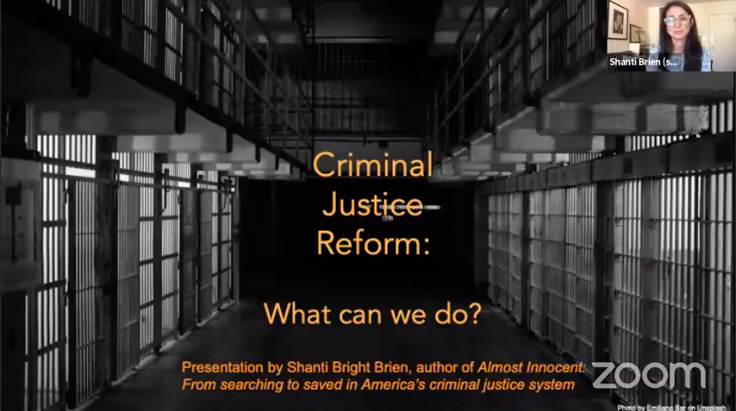Piedmont resident, attorney, advocate and author Shanti Brien has spent 15 years as a criminal defense appellate lawyer thinking about all the ways America’s criminal justice system has failed. At a (virtual) League of Women’s Voters talk on June 22, she reflected on her experience and read passages from her new memoir to highlight the problems of mandatory sentencing, plea bargains, and unconscious bias in the legal system.
“I see hope and resilience and gratitude and self awareness, but mostly I lose, and my clients lose,” she said, noting that this is the way the system is constructed — convictions are typically upheld for a reason. “People often write to me from prison on scraps of papers; my clients hope I can create an argument where others have failed.”
Among her clients:
- Fetu Faraimo received a mandatory minimum sentences of four life sentences plus 30 years and was shipped to a federal prison on the mainland for the importation of methamphetamine from California to Guam. This, despite a later legal decision that made it no longer a crime to import drugs from California to Guam, and three of his six convictions were no longer valid under the new law.
- Deandra Jones, an African-American woman who was arrested for an armed robbery and sentenced to seven years and four months in state prison despite there being weak evidence against her and having a clean record and an alibi. But “she was Black and that made all the difference in the criminal justice system,” said Brien, after a jury heard tapes of what her own attorney described as sounding “ghetto” and turned against her.
- Dorothy Crenshaw, a lawyer in San Jose, was convicted of two felonies and lost her law license in a case arising out of a homeowners association dispute. “I can’t begin to guess how much the state of CA spent on this case,” she said. “Our country is addicted to criminalizing behaviors.”
Brien advocates for a two-pronged approach to criminal justice system reform. First, make the system “smaller” by decriminalizing drugs, eliminating cash bail, treating mental illness and addiction as a public health versus police issue, and reconsidering sentencing, even for “violent” crimes. She urged listeners to vote for legislation that furthers those aims.
“The war on drugs is still going on,” she said. Sentences are still “insane”, the impact is greatest on people of color, the collateral damage of incarceration is profoundly destructive, and we still too easily dismiss “them” as “bad guys” and “criminals.”
She pointed to the MACRO (Mobile Assistance Community Responders of Oakland) as a good example of having civilians, not police, respond to mental health calls. Her final suggestion for making the system smaller was to reconsider sentencing even for violent crimes. “We are overinclusive with the category of violence for black and brown people, but underinclusive obviously when it comes to police or aggression toward women,” Brien said.
Second, she says the system must be made more fair, by creating policies to reduce the use of race in convictions, training and education on race and bias, and “discretion-reducing mechanisms” — forcing judges to write down the reasons for their rulings and police officers to write down why they stopped individuals.
Brien suggested listeners vote for policies that reduce the use of race in convictions, like AB-256, the California Racial Justice Act. Brien also argued that people need to be educated on unconscious bias and systemic racism at every level of the criminal justice system.
At a grassroots level, Brien said everyone can examine their own biases themselves when they call the police, vote locally, and increase empathy for those impacted by the criminal justice system.
Over the last eight months, the Piedmont League of Women Voters has posted recordings of many of their presentations on their YouTube channel. You can watch earlier interviews with Alameda County District Attorney Nancy O’Malley, a town hall with Assemblymember Buffy Wicks, and more HERE.
Shanti Brien is an educator, consultant, writer, and co-founder of Fogbreak Justice. She is the author of Almost Innocent: From Searching to Saved in America’s Criminal Justice Systemand an occasional columnist for Piedmont Exedra.
(This article was updated on July 6 to correct some legal language and the spelling of Fetu Faraimo.)

